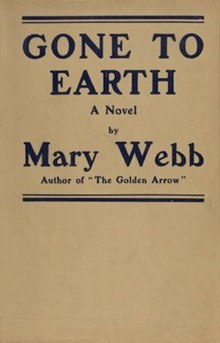
Enoch Arnold Bennett was an English author, best known as a novelist. He wrote prolifically: between the 1890s and the 1930s he completed 34 novels, seven volumes of short stories, 13 plays, and a daily journal totalling more than a million words. He wrote articles and stories for more than 100 newspapers and periodicals, worked in and briefly ran the Ministry of Information in the First World War, and wrote for the cinema in the 1920s. The sales of his books were substantial, and he was the most financially successful British author of his day.

The English novel is an important part of English literature. This article mainly concerns novels, written in English, by novelists who were born or have spent a significant part of their lives in England, Scotland, Wales, or Northern Ireland. However, given the nature of the subject, this guideline has been applied with common sense, and reference is made to novels in other languages or novelists who are not primarily British, where appropriate.
Genre fiction, also known as popular fiction, is a term used in the book-trade for fictional works written with the intent of fitting into a specific literary genre, in order to appeal to readers and fans already familiar with that genre.
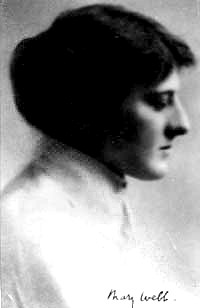
Mary Gladys Webb was an English romance novelist and poet of the early 20th century, whose work is set chiefly in the Shropshire countryside and among Shropshire characters and people whom she knew. Her novels have been successfully dramatized, most notably the film Gone to Earth in 1950 by Michael Powell and Emeric Pressburger based on the novel of the same title. The novels are thought to have inspired the famous parody Cold Comfort Farm (1932) by Stella Gibbons.
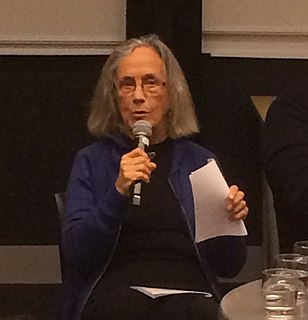
Patricia Frances Grace is a New Zealand Māori writer of novels, short stories, and children's books. She began writing as a young adult, while working as a teacher. Her early short stories were published in magazines, leading to her becoming the first female Māori writer to publish a collection of short stories, Waiariki, in 1975. Her first novel, Mutuwhenua: The Moon Sleeps, followed in 1978.
Literary fiction, mainstream fiction, non-genre fiction or serious fiction is a label that, in the book trade, refers to market novels that do not fit neatly into an established genre ; or, otherwise, refers to novels that are character-driven rather than plot-driven, examine the human condition, use language in an experimental or poetic fashion, or are simply considered "serious" art.
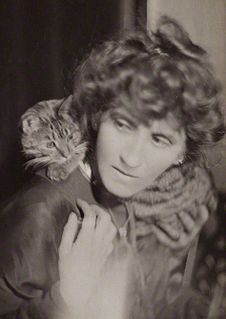
Isobel Violet Hunt was a British author and literary hostess. She wrote feminist novels. She founded the Women Writers' Suffrage League in 1908 and participated in the founding of International PEN.
Proletarian literature refers here to the literature created by left-wing writers mainly for the class-conscious proletariat. Though the Encyclopædia Britannica states that because it "is essentially an intended device of revolution", it is therefore often published by the Communist Party or left wing sympathizers, the proletarian novel has also been categorized without any emphasis on revolution, as a novel "about the working classes and working-class life; perhaps with the intention of making propaganda". This different emphasis may reflect a difference between Russian, American and other traditions of working-class writing, with that of Britain. The British tradition was not especially inspired by the Communist Party, but had its roots in the Chartist movement, and socialism, amongst others. Furthermore, writing about the British working-class writers, H Gustav Klaus, in The Socialist Novel: Towards the Recovery of a Tradition (1982) suggested that "the once current [term] 'proletarian' is, internationally, on the retreat, while the competing concepts of 'working-class' and 'socialist' continue to command about equal adherence".
Literature written in the English language includes many countries such as the United Kingdom and its crown dependencies, Republic of Ireland, the United States, and the countries of the former British Empire. The English language has developed over the course of more than 1,400 years. The earliest forms of English, a set of Anglo-Frisian dialects brought to Great Britain by Anglo-Saxon invaders in the fifth century, are called Old English. Beowulf is the most famous work in Old English, and has achieved national epic status in England, despite being set in Scandinavia. However, following the Norman conquest of England in 1066, the written form of the Anglo-Saxon language became less common. Under the influence of the new aristocracy, French became the standard language of courts, parliament, and polite society. The English spoken after the Normans came is known as Middle English. This form of English lasted until the 1470s, when the Chancery Standard, a London-based form of English, became widespread. Geoffrey Chaucer, author of The Canterbury Tales, was a significant figure in the development of the legitimacy of vernacular Middle English at a time when the dominant literary languages in England were still French and Latin. The invention of the printing press by Johannes Gutenberg in 1439 also helped to standardise the language, as did the King James Bible (1611), and the Great Vowel Shift.
Jean Bedford is an English-born Australian writer who is best known for her crime fiction, but who has also written novels and short stories, as well as nonfiction. She is also an editor and journalist, and has taught creative writing in several universities for over 20 years.

Annie Shepherd Swan, CBE was a Scottish journalist and fiction writer. She wrote mainly in her maiden name, but also as David Lyall and later Mrs Burnett Smith. A writer of romantic fiction for women, she had over 200 novels, serials, stories and other fiction published between 1878 and her death. She has been called "one of the most commercially successful popular novelists of the later nineteenth and early twentieth centuries". Swan was politically active in the First World War, and as a suffragist, a Liberal activist and founder-member and vice-president of the Scottish National Party.
When studying literature, biography and its relationship to literature is often a subject of literary criticism, and is treated in several different forms. Two scholarly approaches use biography or biographical approaches to the past as a tool for interpreting literature: literary biography and biographical criticism. Conversely, two genres of fiction rely heavily on the incorporation of biographical elements into their content: biographical fiction and autobiographical fiction.
Anuradha Roy is an Indian novelist, journalist and editor. She has written five novels: An Atlas of Impossible Longing (2008), The Folded Earth (2011), Sleeping on Jupiter (2015), All the Lives We Never Lived (2018), and The Earthspinner (2021).

Love in the Wilderness is a 1907 novel by the British writer Gertrude Page. It was her debut and breakthrough novel, which she followed with the even more successful Paddy the Next Best Thing the following year. The novel takes place in Rhodesia, which Page had herself emigrated to with her husband several years earlier.
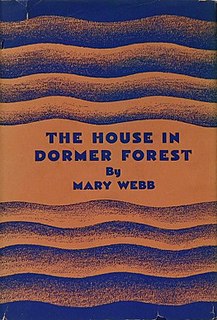
The House in Dormer Forest is a 1920 romance novel by the British writer Mary Webb. It was part of a wave of regional novels set across Britain, in Webb's case in her native Shropshire. She wrote it while living at her home near Bayston Hill. It was one of several works that inspired the later parody novel Cold Comfort Farm by Stella Gibbons.

Seven for a Secret is a 1922 romance novel by the British writer Mary Webb. She wrote to Thomas Hardy asking if she might dedicate the novel to him, to which he agreed. As with her other novels it takes place in her native Shropshire. The title is taken from the traditional nursery rhyme One for Sorrow.

Lucy Carmichael is a 1951 romantic drama novel by the British writer Margaret Kennedy. It was her tenth published novel. It was well-received by critics but did not repeat the success of her earlier hits The Constant Nymph and Escape Me Never. It was a Literary Guild choice in America. In 2011 it was reissued by Faber and Faber.
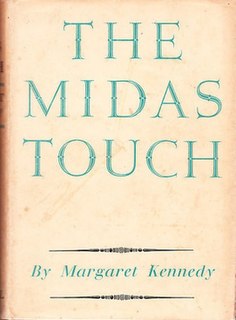
The Midas Touch is a 1938 novel by the British writer Margaret Kennedy. It was her eight novel, she then took a decade-long break before producing her next work The Feast in 1950. It was a Daily Mail Book of the Month.

The Ladies of Lyndon is a 1923 novel by the British writer Margaret Kennedy. Her debut novel, it was rell-received and she followed it the next year with her breakthrough novel The Constant Nymph.

The Feast is a 1949 novel by the British writer Margaret Kennedy. It is a modern reworking of the seven deadly sins. Her ninth novel, it was her first in more than a decade. It was a Literary Guild choice in America.
